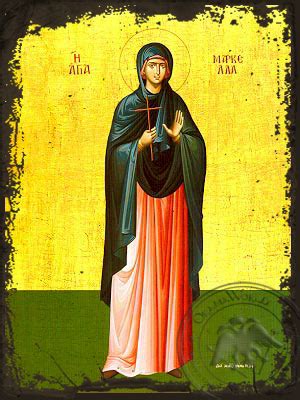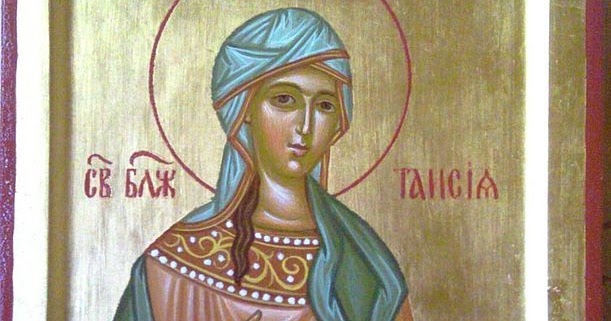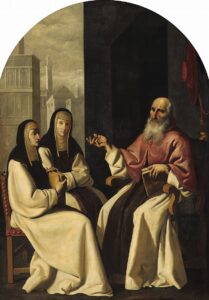Female saints shaped Christianity in unexpected ways. St. Perpetua, the first known Christian female writer, gave us one of the oldest Christian texts that exists today. St. Mary Magdalene, known as the “Apostle to the Apostles,” and St. Nino, who converted an entire nation to Christianity, were nowhere near passive observers of their faith. Early saints like Macrina the Younger and Marcella made the most important contributions to theological discussions and scholarship, despite their era's cultural constraints. Many influential Catholic women of the early Church built communities focused on learning. They founded hospitals for the sick and faced martyrdom with remarkable courage. Their legacy shows a blend of intellectual engagement, charitable works, and steadfast faith that helped build Christian history's foundation.
Let me take you through these hidden heroes' stories, from prominent figures in the Roman Canon to lesser-known desert mothers who pioneered Christian monasticism. The stories of these early saints need to be told, shared, and celebrated.

Saints of the Roman Canon: Honoring the Women Invoked During the Mass
In the bustling city of second-century Rome, there lived a remarkable woman whose unwavering devotion and extraordinary grace in the face of death continue to inspire generations.
St. Cecilia
St. Cecilia, her name etched in the annals of history, stands as a testament to the power of faith and the enduring influence of music and poetry. As she faced martyrdom, her voice soared, filling the air with hymns that echoed through the ages, a resounding melody of steadfastness and unwavering commitment.
St. Cecilia's story, however, is not limited to her remarkable courage in the face of persecution. She is also revered as the patroness of musicians and poets, a symbol of the profound connection between art and spirituality. Her life serves as a poignant reminder that even in the darkest of times, when the world seems engulfed in chaos and despair, the power of music and poetry can bring solace and inspiration, transcending the boundaries of time and space.
St. Agatha of Sicily
Another woman whose name resonates through the centuries is St. Agatha of Sicily. Born into a noble family, she faced a pivotal moment in her life when she rejected the advances of a Roman prefect, choosing instead to consecrate her life to Christ. This act of defiance set her on a path of remarkable fortitude, as she endured brutal torture and persecution for her unwavering dedication to her faith. St. Agatha's story stands as a testament to the indomitable strength that lies not in physical might but in the unwavering commitment to one's beliefs. Her steadfastness became a beacon of hope for countless Christians in the early Church, a reminder that true heroism often comes wrapped in quiet determination rather than grand gestures.
St. Lucy of Syracuse
In the liturgical tradition, St. Lucy of Syracuse holds a special place. Her name, meaning “light,” perfectly reflects her role in Christian history. St. Lucy embraced a life of radical charity, selflessly distributing her entire dowry to the poor. Even in the face of persecution, she remained resolute, shining as a beacon of hope for all Christians facing similar trials. St. Lucy's story serves as a powerful reminder that even in the darkest of times, when the world seems enveloped in shadows, the light of faith can guide us and illuminate our path, offering solace and strength.
These women, whose names we hear during the solemn Eucharistic Prayer, represent more than mere historical figures mentioned in the Roman Canon. They embody the extraordinary courage and unwavering faith of early Catholic women who played a pivotal role in shaping our faith. Their stories continue to inspire us today, reminding us that true heroism often lies in the quiet determination to live lives of unwavering faith and conviction. As we gather to honor these remarkable early saints during the Mass, let us draw strength from their examples and strive to emulate their unwavering commitment to faith, knowing that their legacy lives on in the hearts of believers throughout the ages.

Lesser-Known Early Christian Saints: Celebrating the Unsung Heroines of the Faith
In the early days of Christianity, there were countless women who played pivotal roles in shaping the faith and demonstrating unwavering commitment to their beliefs. These women, often overlooked in historical accounts, deserve recognition for their courage, wisdom, and devotion.
Sts. Perpetua and Felicity
One such woman is St. Perpetua, a young noblewoman who, along with her slave Felicity, faced martyrdom together during a time of persecution. Their story serves as a powerful testament to the idea that faith grows stronger through partnership and the support of loved ones. Despite the imminent threat to their lives, they chose death rather than renounce their faith, inspiring generations to come.
St. Blandina
Another woman whose story resonates deeply is St. Blandina, a second-century slave from Lyon. Despite enduring multiple days of torture, she remained steadfast in her faith and provided support to her fellow Christians. Her unwavering commitment to her beliefs is particularly remarkable because she defied societal expectations and remained true to her faith, becoming a lasting symbol of Christian courage and an outstanding example of the early saints.
St. Macrina the Younger
St. Macrina the Younger, a brilliant theologian and teacher, played a pivotal role in shaping the thinking of her brothers, St. Basil the Great and St. Gregory of Nyssa, who would later become influential Church Fathers. Her intellectual legacy continues to inspire Catholic women today, highlighting the important contributions of women in the development of Christian thought. Through her teachings and writings, she left an indelible mark on the early Christian community, reminding believers of the power of knowledge and the importance of intellectual pursuits in the pursuit of faith.
St. Lydia of Thyatira
Europe's first documented Christian convert, St. Lydia of Thyatira, also deserves recognition for her significant role in early Christianity. As a successful businesswoman running a purple cloth business, she not only embraced the Christian faith but also opened her home to fellow believers. In fact, her house eventually became one of Europe's first Christian churches, a testament to her unwavering commitment to her newfound faith. Her story serves as a powerful reminder that faith can thrive even in the midst of worldly success, and that one's material wealth should never hinder their spiritual growth.
Although their names may not be as familiar as others, these women deeply impacted early Christianity. The stories of these early saints, alongside their better-known counterparts, form a foundation of courage, wisdom, and devotion that inspires believers even today. Their unwavering commitment to faith, regardless of social status, highlights how holiness transcends societal expectations and showcases the strength and resilience of women in the early Church. These legacies empower modern women of faith, underscoring their vital role in the ongoing story of Christianity.

Women Scholars and Disciples: Female Leaders in Theology and Charity
The remarkable stories of St. Marcella and St. Fabiola exemplify the extraordinary fusion of intellectual prowess and compassionate service that characterized many early Catholic women. St. Marcella's unwavering dedication to defending orthodox Christianity against heretical teachings not only solidified her reputation as a formidable intellectual force but also demonstrated her deep commitment to preserving the integrity of the faith. Her scholarly discussions and debates attracted the finest minds of Rome, creating a vibrant intellectual community that fostered the exchange of ideas and the pursuit of truth.
Despite her intellectual pursuits, St. Marcella remained grounded in her commitment to teaching and guiding simple believers. She recognized the importance of making complex theological concepts accessible to all, ensuring that the fruits of her intellectual endeavors were not confined to an elite few. Her ability to seamlessly blend intellectual rigor with practical compassion is truly inspiring, as it reminds us that true wisdom is not meant to be confined within the ivory towers of academia but should be shared and applied in the service of others.
St. Fabiola
Similarly, St. Fabiola's life story is a testament to the transformative power of personal conversion and the profound impact that one individual can have on society. After experiencing a personal conversion, St. Fabiola channeled her wealth and intelligence into selfless service, establishing the first public hospital in Western Europe. This visionary act not only provided much-needed medical care to the sick and suffering but also laid the foundation for a healthcare model that would shape the course of history for centuries to come.
What sets St. Fabiola apart is not just her philanthropic endeavors but also her hands-on approach to caring for the sick. Despite her extensive medical knowledge, she personally attended to the needs of the patients, offering comfort, healing, and hope. Her actions undoubtedly inspired countless others to follow in her footsteps, perpetuating a legacy of compassionate care that continues to this day.
Intellectual Giants
The impact of these remarkable women extends far beyond their individual achievements. By challenging societal norms and revolutionizing the prevailing views of women's roles within the Church, they paved the way for future generations of women to pursue intellectual pursuits and engage in acts of service. Their legacy serves as a powerful reminder that true wisdom is not confined to the realm of academia but is best expressed through tangible acts of love and selflessness.
The intellectual giants among early Catholic women, such as St. Marcella and St. Fabiola, have left an indelible mark on history through their profound contributions to Christian thought and their unwavering commitment to practical compassion. The intellectual pursuits and charitable endeavors of these early saints continue to inspire and guide us, reminding us that true wisdom is not confined to the realm of academia but is best expressed through selfless acts of love and service. Their lives serve as a shining example of the harmonious union between intellectual rigor and practical compassion, encouraging us to follow in their footsteps and make a positive difference in the world.

The Desert Mothers: Pioneers of Early Christian Monasticism
The harsh Egyptian desert, with its unforgiving terrain and scorching heat, became the unlikely backdrop for a remarkable movement that would forever change the course of Christian monasticism. It was within this arid and desolate landscape that a group of extraordinary women, known as the desert mothers or ammas, sought solace and solitude to forge a deep and profound connection with God.
St. Thaïs
One such Catholic woman was St. Thaïs, whose story serves as a testament to the transformative power of repentance. Blessed with extraordinary beauty and surrounded by a life of luxury, she made the courageous decision to abandon her opulent existence and embrace the austere and ascetic lifestyle of the desert. Her journey of conversion continues to inspire countless individuals who yearn for spiritual renewal and seek a deeper connection with the divine.
St. Mary of Egypt
Among the desert mothers, St. Mary of Egypt stands as the most celebrated figure. Her remarkable transformation from a life of worldly pleasures to that of a revered spiritual guide exemplifies the essential qualities that defined these women. Extreme asceticism and physical endurance were the hallmarks of their existence, as they willingly embraced the hardships of the desert in their quest for spiritual enlightenment.
St. Melania the Younger
But it was not just their physical endurance that set the desert mothers apart. Through solitary contemplation and deep introspection, they gained profound wisdom and insight, becoming spiritual guides for those who sought their counsel. St. Melania the Younger, for example, took a different path by establishing monastic communities that blended contemplative life with charitable works, embodying a holistic approach to spirituality.
The desert mothers were not limited to a select few; their ranks included other notable figures such as St. Pelagia and St. Sarah of the Desert. Each of these women developed their own unique approaches to desert spirituality, drawing upon their individual experiences and insights. St. Sarah, in particular, spent an astonishing sixty years near the banks of the Nile River, sharing her spiritual wisdom with all who sought her guidance.
The Desert Mothers
What captivates me most about the desert mothers is their radical rejection of societal expectations. In a world that often confined women to prescribed roles and limited their opportunities for spiritual growth, these remarkable Catholic women defied convention and created their own spiritual practices. In fact, their practices often surpassed the rigor and austerity of their male counterparts, challenging the notion that holiness was the sole domain of men.
The legacy of the desert mothers extends far beyond their individual stories. Their tradition of female spiritual leadership, spanning over six decades, left an indelible mark on Christian monasticism, shaping its trajectory for centuries to come. Their examples continue to challenge and inspire us today, reminding us that true spirituality often requires us to step outside our comfort zones and venture into the unknown.
In a world where secular expectations still persist, the desert mothers' unwavering commitment to their spiritual calling serves as a powerful reminder that holiness knows no bounds. Their stories resonate with individuals from all walks of life, encouraging us to embrace our own unique paths and seek a deeper connection with the divine. The desert mothers' enduring legacy is a testament to the transformative power of faith and the boundless potential that lies within each of us.

Conclusion
These remarkable women saints have created a lasting legacy that reaches way beyond their time. My research into their lives shows that these hidden heroes shaped Christianity through their intellectual prowess, steadfast courage, and deep spiritual wisdom.
St. Perpetua's writings, St. Marcella's scholarly work, and St. Fabiola's groundbreaking healthcare initiatives show these Catholic women actively shaped Christian history rather than watching from the sidelines. Their stories challenge common beliefs about women's roles in the early Church.
The desert mothers carved their own path to holiness in the harsh Egyptian wilderness, which makes their stories truly powerful. These women, among scholars like St. Macrina and martyrs like St. Cecilia, show that sanctity thrives in many forms. Their examples resonate today and demonstrate how authentic faith transforms both people and communities.
Centuries might separate us from these extraordinary women, but their courage, wisdom, and dedication still guide our path. Their stories teach us that holiness transcends gender, social status, and education. These hidden heroes of early Christianity deserve our admiration and our effort to keep their legacy alive.
Bronwen McShea has written a fantastic book exploring these women saints and many other early female saints in Women of the Church: What Every Catholic Should Know, available from Ignatius Press. I highly recommend it!
Auto Amazon Links: No products found.



One Response